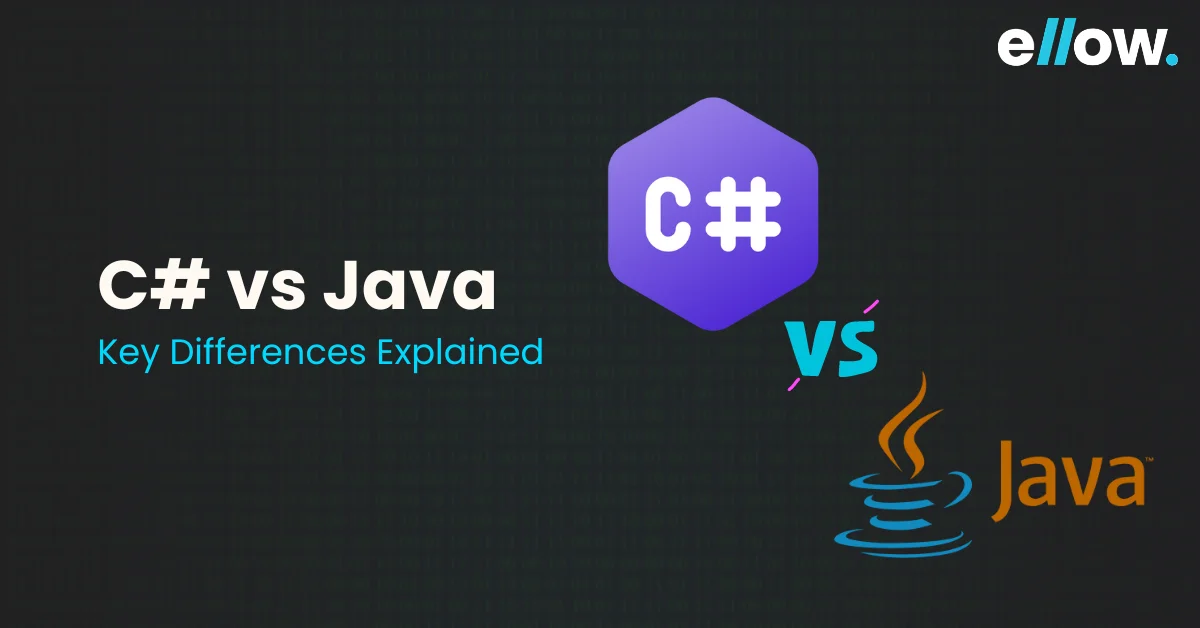Let’s build the future together.
Great ideas need great people. Partner with us to bring your vision to life, or take the first step in your career by joining our team of innovators.
Receive new articles delivered Straight to your inbox

C# and Java are two leading languages in the world of back-end development, cloud applications, Windows client programs, and big data processing. Despite their similar syntax, each language offers unique frameworks and capabilities that shape their respective strengths and weaknesses.
Recent trends in the TIOBE Index show a notable shift in their popularity. Java experienced a decline of 3.92%, while C# saw an increase of 3.29% among all programming languages, signaling changing preferences in the developer community.
Java excels in mobile applications, multi-user utility programs, embedded systems, and IoT development. On the other hand, C# is ideal for server applications, complex software with rich graphical interfaces, and computer games.
Understanding the key differences between these languages is crucial for selecting the right one for your next project.
This guide explores the features, performance, advantages, and disadvantages of Java and C#, offering a comprehensive comparison to help you make an informed decision.
C#, pronounced “C-sharp,” was developed by Microsoft in 2000. It is an object-oriented, component-oriented, lexically scoped, generic, and strongly typed programming language.
C# is known for its modern features and simplicity, which make it highly effective for various applications. The language continuously evolves, incorporating new integrations and contemporary elements.
Several notable companies utilize C# in their development processes, including:
Numerous tools integrate seamlessly with C#, enhancing its functionality and ease of use:
These tools and the continuous evolution of C# contribute to its strong presence in modern software development.
Java, created in 1995, is a popular programming language known for its platform independence, summed up by the motto “Write Once, Run Anywhere.” Thanks to its object-oriented nature, it is versatile and widely used in various fields, including web development, mobile applications, and enterprise systems.
Many prominent companies rely on Java for their applications, including:
Due to Java’s longevity, numerous tools integrate seamlessly with it, such as:
Java remains a robust, versatile language widely adopted across various industries for its reliability and extensive ecosystem.
Recommended Read: Level Up Your Skills: Discover the Top 5 Java Certifications for Developers
C# delivers strong performance primarily due to its use of the Just-in-Time (JIT) compiler, which translates code into machine language just before execution, optimizing CPU usage and ensuring quick response times. This makes C# particularly efficient in resource management. Java, while also offering high performance, relies on the Java Virtual Machine (JVM) and JIT compilation, which can lead to higher memory consumption.
Despite this, Java maintains good performance across various platforms, but the additional memory usage often makes it less efficient than C#. Therefore, in terms of overall performance efficiency, C# holds a slight edge over Java.
Winner: C#
Both C# and Java have similar syntax as they are derived from C and C++. They support object-oriented programming and features like garbage collection. However, C# developers can use properties, providing a simpler way to access class data, while Java requires the use of getter and setter methods for the same purpose.
Additionally, Java has built-in annotation processing, allowing developers to add metadata to their code, which is not present in C#. These differences, while subtle, can influence developer preference based on the ease of use and specific needs of the project.
Winner: Tie
In web development, the choice between C# and Java depends on the project’s requirements. C# is ideal for developing games, Windows applications, cloud-based solutions, and enterprise software.
It is widely used by companies like Microsoft, Alibaba, and Stack Overflow. On the other hand, Java offers greater flexibility and is extensively used for Android apps, data center applications, and cloud-based services.
Companies like Google, Netflix, Airbnb, and Amazon prefer Java for their web development needs. Both languages are robust and capable, making neither superior to the other, but rather suited to different types of web development projects.
Winner: Tie
Java’s versatility shines through its use in a wide range of applications, including web applications, scientific software, Android apps, and cloud-based services. Its platform independence and extensive libraries make it adaptable to various environments. Java’s robustness and scalability also make it a go-to choice for large-scale enterprise systems and data center applications.
On the other hand, C# is highly versatile within the Microsoft ecosystem, excelling in Windows applications, video games, and enterprise software. It supports a wide range of application types, including web and cloud-based applications, making it a strong contender for diverse development needs.
Winner: Java
Java provides strong security through its static typing and automatic code verification, which helps prevent type-related errors and ensures code correctness before execution. Its robust security model includes a built-in sandbox for running untrusted code, reducing the risk of harmful operations. However, Java’s reliance on external libraries can introduce vulnerabilities if not managed carefully.
C#, while offering good security features, is more prone to threats such as SQL injection and command injection attacks. Some of its functions can be exploited if not properly secured. Despite this, C# includes features like Code Access Security (CAS) to help protect applications from unauthorized access.
Winner: Java
Speed of development refers to how quickly and efficiently a language allows developers to build and deploy applications. C# is designed to enhance productivity, particularly for Windows platforms, with features like integrated development environments (IDEs) such as Visual Studio and support for code reuse.
This can significantly reduce development time. On the other hand, Java is known for its platform-independent syntax, meaning code behaves consistently across different environments, simplifying development and debugging.
Both languages benefit from robust libraries and frameworks, enabling developers to quickly implement complex features. Thus, the speed of development largely depends on the project requirements and the development team’s expertise.
Winner: Tie
Microservices is an architectural style in software development where a large application is divided into smaller, independent services. Each microservice performs a specific function and can be developed, deployed, and scaled independently. This approach enhances flexibility and scalability, allowing teams to work on different services simultaneously without affecting the entire application.
Microservices communicate with each other through APIs, often using lightweight protocols like HTTP/REST or messaging queues. This architecture improves fault isolation, as failures in one microservice do not necessarily impact others, and facilitates continuous integration and delivery, leading to faster and more reliable software development and deployment.
Winner: Java
Here’s a tabular comparison between C# and Java based on the parameters provided:
| Feature | C# | Java |
| Operator Overloading | C# supports operator overloading for multiple operators. | Java does not support operator overloading. |
| Runtime Environment | C# supports CLR (Common Language Runtime). | Java supports JVM (Java Virtual Machine). |
| API Control | An open-source community controls c # APIs. | Open community processes also control Java APIs. |
| Public Classes | Multiple public classes are allowed in C#. | Only one public class is allowed per source file in Java, otherwise, it results in a compilation error. |
| Checked Exceptions | C# does not support checked exceptions. | Java supports both checked and unchecked exceptions. |
| Platform Dependency | C# is cross-platform (Windows & Unix-based systems). | Java is platform-independent, running on JVM. |
| Pointers | Pointers can be used in unsafe mode in C#. | Java does not support pointers. |
| Conditional Compilation | C# supports conditional compilation. | Java does not support conditional compilation. |
| goto statement | C# supports the goto statement. | Java does not support goto statements; using them results in errors. |
| Structure and Union | C# supports structures and unions. | Java does not support structures and unions. |
| Floating Point | C# does not support the strictfp keyword. | Java supports strictfp keyword for consistent floating-point calculations. |
| Language | C# is based on the C family (C and C++). | Java is an independent language. |
| Routing | Uses ASP.Net for routing configuration. | Uses akka.routing for routing configuration. |
| Dependency Injection | Uses dependency injection. | Supports dependency injection and modification. |
| Speed | Generally slower than Java. | Generally faster than C#. |
| Polymorphism | Supports polymorphism by default. | Supports polymorphism by default. |
| Delegates | Contains delegates. | Does not contain delegates. |
This table summarizes the differences between C# and Java across various technical aspects, highlighting their strengths and differences in programming paradigms and language features.
C# is the preferred language when your primary focus is on developing applications that are tightly integrated with the Windows ecosystem. This includes desktop applications, backend services, and even modern web applications using technologies like ASP.NET.
The key advantage of C# lies in its seamless integration with the .NET framework, which provides robust libraries and tools for building sophisticated user interfaces and backend services.
Developers often choose C# for its ease of use, strong type safety, and extensive support from Microsoft and the developer community.
Java excels in scenarios where cross-platform compatibility is crucial. It is the go-to language for developing applications that need to run on various platforms, including mobile devices, desktop systems, web servers, and embedded systems like IoT devices.
Java’s “write once, run anywhere” philosophy, supported by the Java Virtual Machine (JVM), ensures that applications written in Java can run consistently across different operating systems and hardware architectures.
While Java applications may exhibit slightly slower performance compared to those developed in C#, its versatility and widespread adoption make it an ideal choice for projects requiring broad platform support and scalability.
Understanding the differences between Java and C# through this detailed comparison can greatly inform your language choice for development projects. Both languages bring unique strengths to the table, making either a viable option depending on your specific needs.
Whether you opt for the robust versatility of Java or the seamless integration of C#, assessing your project requirements is crucial.
At ellow.io, we specialize in connecting you with skilled developers proficient in both C# and Java. Let us help you find the perfect developer to meet your development goals.
Both C# and Java are considered beginner-friendly languages. However, C# is often praised for its simpler syntax and ease of use, especially for developers familiar with C-style languages like C++ or JavaScript.
Both C# and Java offer excellent performance for most applications. Java is known for its robust performance due to its efficient virtual machine (JVM), while C# benefits from the optimizations provided by the .NET runtime environment. Performance differences are often negligible and depend more on specific implementation details rather than the language itself.
Java has historically been more widely used in enterprise applications and Android development, making it a prevalent choice in many industries. However, C# has gained significant popularity, especially in the Microsoft ecosystem, for building Windows applications, web services, and games using Unity.
Yes, applications written in C# can be deployed on platforms other than Windows. With the introduction of .NET Core (now .NET 5 and later), C# applications can be cross-platform, running on Linux and macOS, in addition to Windows. This makes C# a versatile choice for developers targeting multiple operating systems.
Both C# and Java provide robust integration capabilities with various technologies and frameworks. Java's extensive ecosystem and platform independence make it highly compatible with a wide range of systems and services. On the other hand, C#'s integration with Microsoft technologies like Azure and .NET framework libraries offers seamless interoperability within the Windows ecosystem.

GCC vs Outsourcing vs Remote Teams: What Works in 2026

Vibe Coding vs AI Assisted Coding: The Difference That Will Define the Next Generation…

From Code Generation to Bug Detection: 10 AI Tools Every Developer Should Know in…
Please feel free to share your thoughts and we can discuss it over a cup of tea.
Get a quote
GCC vs Outsourcing vs Remote Teams: What Works in 2026

Six Things to Consider When Hiring Remote Talent

ellow.io enters remote hires market with AI-based screening process
Great ideas need great people. Partner with us to bring your vision to life, or take the first step in your career by joining our team of innovators.
Looking to build your career in development? team@ellow.io